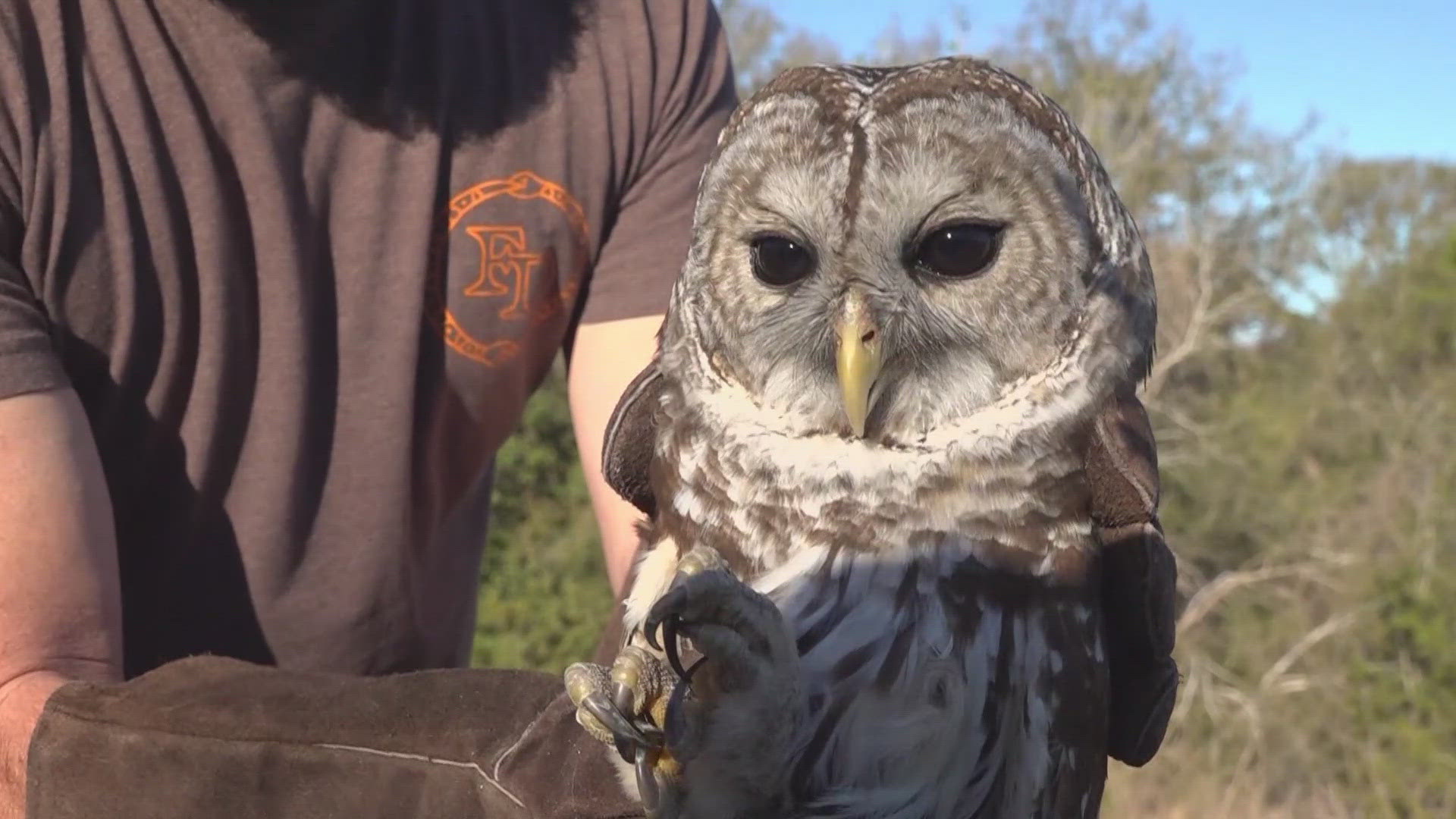SAN ANTONIO — Eight-year-old Matilda said she was really looking for golf balls at the abandoned Republic Golf Club site when she came across a far more interesting find earlier this year.
Exploring the area with her dad, who was doing a tree survey for the new Arboretum San Antonio development, Matilda said she heard an unusual noise in the tall grass.
"She's like 'Dad, look down' and there was this little baby owl on the ground underneath this 60 ft. tall pecan tree," Matilda's dad Scott Anderson of Urban Tree Company said.
"We were really concerned about its safety because it hadn't really molted and it couldn't fly and there weren't any good trees to put the the bird back into," Anderson said.
Matilda said her dad retrieved a jacket from his truck and they carefully wrapped the small, downy bird up and took it for expert medical care at Last Chance Forever, the Bird of Prey Conservancy.
The local non-profit has been putting injured raptors back into the wild for decades with no help from local, state or federal government resources.
Ian Joplin, with the group, said the bird received a thorough screening and didn't have any apparent injuries but it's full flight feathers had not grown in yet so it needed time to mature.
The bird was paired with another youngster who was at the facility recovering from a broken wing. Joplin said they shared quarters as they learned to fly and eventually learned to hunt live prey.
Joplin said teaching young birds what their parents would have in the wild is a vital part of rehabilitation.
"Sometimes people have a hard time understanding that for a humane organization because we care about animals. How could we do that? But we do think it's part of our responsibility because this was a bird that was in the nest being fed by its parents," Joplin said, adding "If it had never killed something before, we think it would be much more cruel to spend all the time and money and effort that we do keeping this bird healthy and wild to just release it for it to starve to death because we didn't give it all the tools that it needed to survive."
Joplin said with both birds strong, healthy and hunting, they knew it was time to set the pair free, so they returned to the spot where Matilda and her dad found the fallen bird months ago.
"I'm happy," Joplin said "I mean this is the whole reason why we do the work that we do, is to get these birds back into the wild."
Recognizing their importance in the natural order, Joplin said "It's just wonderful to see these birds back in the wild because I truly believe our world is better for sharing it with them."
Walking deep into the 180-acre preserve that hugs the banks of the Salado Creek off Southeast Military Drive, Joplin found the perfect rise to release the two birds, a grassy knoll with a nearby tree line that would give the birds a chance to stretch their wings and a chance to rest, get their bearings and adjust to their new-found freedom.
Joplin removed plastic ID tags from the legs of the birds before tossing one into the air and watching it soar.
Anderson followed with the second bird, who looped back over the heads of spectators and picked a tall tree to perch.
Anderson, who said he has done raptor rehabilitation work in the past, said "That moment though when you release a bird, it's amazing. I mean I think that feeling of returning something to where it should be and thinking about what that bird's feeling and what it's sensing. It's a cool thing."
Joplin said studies show many young raptors never make it to adulthood.
Anderson said "Statistics show that 85% of baby raptors don't survive, and here this one's gonna live so it's a good day."
As soon as the raptors launched, other birds in the area took notice. A bunch of crows circled around in a noisy attempt to rattle the new neighbors but they quickly took off.
Watching with rapt attention, Matilda spotted the ID band her bird had been wearing and picked it up as a keepsake of a precious day.
"I found it on the ground when they took it off and I'm going to put it on my necklace that has a bunch of special stuff. It's like a BFF necklace," Matilda said, agreeing that it would be good to have an owl as a Best Friend Forever.
More information about the Arboretum San Antonio project, which will be a sanctuary for trees, animals and people, can be found by clicking here.

